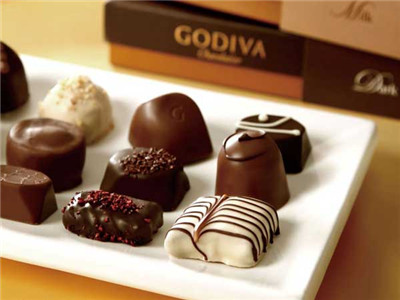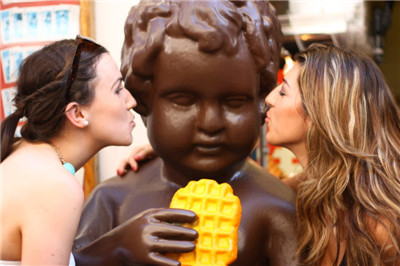For the Travel section’s Oct. 19 issue on Europe, writers and editors selected special items to profile from a dozen cities. Below, explore everything from chocolate in Brussels to silk in Florence to design in Copenhagen.
在欧洲版10月19日旅游板块,作者与编辑精选了十二个城市的独特珍宝,下面,我们从布鲁塞尔的巧克力、佛罗伦萨的丝绸到哥本哈根的设计,逐一欣赏吧。

Brussels: Chocolate
布鲁塞尔的巧克力
Nearly half the chocolate consumed in the world is savored in Europe, and Belgium — with per-capita consumption of 14.99 pounds a year —certainly devours its fair share. While Brussels, the country’s capital, is home to hundreds of chocolatiers, what makes a visit imperative, at least from a chocophile’s perspective, is the rich heritage of artisanal chocolate-makers.
全世界的巧克力消费总量近半在欧洲,而比利时每人每年消费的巧克力达14.99磅,显然远超平均水平。在比利时的首都布鲁塞尔,有数百家手工巧克力商店传承着手工巧克力制作的宝贵工艺。这是全世界巧克力爱好者的必游之地。
And none epitomizes the nation’s devotion to craft and quality more than Mary. Mary Delluc established her business in 1919 on the Rue Royale, the route the king took to the Royal Palace each day. In 1942 she achieved her goal of becoming the chocolate purveyor to the royal family, an honor that was bestowed on the brand three more times, most recently in 2013. While Mary has retained a presence on Rue Royale for 95 years, it has changed address three times, the most recent (Rue Royale 73) undergoing an overhaul in 2010.
说起对比利时巧克力工艺和品质的贡献,谁也无法超过玛丽巧克力店。1919年,玛丽·德鲁克(Mary Delluc)创建了自己的公司,店址在皇室大道,那是国王去王宫时每天的必经之路。1942年,她实现了自己的目标,成为比利时王室的御用巧克力供应商。该品牌享有这一殊荣已有三次,最近的一次是2013年。玛丽巧克力店已在皇室大道巍然屹立了95年,其间搬了三次家,最近的一次是在2010年,经过全面翻新后,搬到了皇室大道73号。

“We went back to the roots of Mary,” the managing director, Olivier Borgerhoff, said, noting the return to the original white-and-gold color scheme and prominence of the oblong logo. As for the chocolate, it might as well be the 20th century. “We don’t change the types of chocolates often,” Mr. Borgerhoff said. “We try to improve the choices we have.” That means sourcing top-quality ingredients and eschewing preservatives and unnatural additives of the dozens of caramel, marzipan, mousse, ganache and cream-filled bonbons that are stacked in neat rows down a long central counter, along with glass bowls of hand-rolled truffles, flaked with almonds and dusted in powdered sugar. A 250-gram box is 17 euros ($21).
“我们回到了玛丽的根,”常务董事奥利维尔·伯格霍夫(Olivier Borgerhoff),他指的是恢复了最初的白色与金色的配色方案及强调椭圆形商标。说起巧克力,或许还是20世纪更好。“我们不会经常改变巧克力的类型。”伯格霍夫先生说。“而是尽力优化已有的选择。”这意味着要寻找顶级的优质配方,在数十种焦糖、杏仁蛋白软糖、慕斯、甘那许酱和奶油夹心软糖中避免使用防腐剂或非天然的添加剂。这些甜点一排排整齐地堆叠在店铺中央一条长柜台上,旁边的玻璃碗里盛放着手工制成的松露巧克力,点缀着杏仁,外面撒着糖粉。250克一盒的售价17欧元(约等于21美元)。
Another chocolatier, Debailleul, is decidedly more whimsical. The small chain, established in 1983 by Marc Debailleul, produces bonbons and ballotins, or boxes, that are so refined and beautiful, it’s almost — almost — a shame to indulge. The options are limited: traditional pralines and creamy ganaches, many hand-painted with cupids, the letter “D” or other flourishes, and vanilla, coffee and caramel-flavored truffles. Visit the factory store (Rue de Ganshoren 27-39). It will be as if you’ve discovered secret treasures of the chocolate capital. AMY M. THOMAS
还有一家名叫德百丽(Debailleul)的手工巧克力厂,显然更加珍奇有趣。这家小型连锁企业由马克·德百丽(Marc Debailleul)始建于1983年,出产夹心软糖、小包装或者盒装。它的甜点口感如此精致美妙,你会觉得肆意大嚼几乎是一种羞耻。选择很有限:传统的胡桃糖和奶油鲜美的甘那许酱,糖果上装饰着手绘的丘比特、字母D或者其他花纹,还有香草、咖啡和焦糖口味的松露巧克力。建议游览工厂店(店址在汉斯霍伦路27-29号),感觉就像在巧克力之都寻找秘藏的珍宝。艾米·托马斯(AMY M. THOMAS)供稿。














